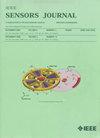用微控制器adc实现电阻式传感器的简单双线引线补偿
IF 4.3
2区 综合性期刊
Q1 ENGINEERING, ELECTRICAL & ELECTRONIC
引用次数: 0
摘要
本文介绍了一种简化的双线测量系统,利用安德森电流环对电阻传感器进行精确的电阻测量。提出的配置具有一个精密参考电阻(${R}_{\text {ref}}$)和两个二极管(${D}_{{1}}$和${D}_{{2}}$),直接与模数转换器(ADC)和微控制器的输出引脚接口,从而消除了对外部稳定电阻的需求。利用比率电压测量和自适应调谐因子,该系统有效地补偿了引线电阻和二极管失配。使用ATmega2560微控制器实现的原型演示了与Pt100传感器对应的60 - 320~\Omega $范围内的精确电阻测量,对于4.87~\Omega $的引线电阻和10.0~\Omega $的引线电阻,不确定度误差小于0.13%和0.15%。实验结果证实了该系统在长引线长度上的精度和可靠性,为需要精确温度测量的工业和遥感应用提供了经济有效且强大的解决方案。本文章由计算机程序翻译,如有差异,请以英文原文为准。
Simple Two-Wire Lead Compensation for Resistive Sensors Using Microcontroller ADCs
This article introduces a simplified two-wire measurement system for accurate resistance measurement of resistive sensors, leveraging the Anderson current loop. The proposed configuration features a precision reference resistor ( ${R}_{\text {ref}}$ ) and two diodes ( ${D}_{{1}}$ and ${D}_{{2}}$ ), directly interfaced with the analog-to-digital converter (ADC) and output pins of a microcontroller, eliminating the need for external stabilization resistors. Utilizing ratiometric voltage measurements and an adaptive tuning factor, the system effectively compensates for lead-wire resistance and diode mismatches. A prototype implemented with an ATmega2560 microcontroller demonstrates accurate resistance measurements in the range of 60– $320~\Omega $ , corresponding to a Pt100 sensor, achieving an uncertainty error of less than 0.13% for a lead-wire resistance of $4.87~\Omega $ and 0.15% for $10.0~\Omega $ . Experimental results confirm the system’s precision and reliability over long lead lengths, offering a cost effective and robust solution for industrial and remote sensing applications requiring accurate temperature measurements.
求助全文
通过发布文献求助,成功后即可免费获取论文全文。
去求助
来源期刊

IEEE Sensors Journal
工程技术-工程:电子与电气
CiteScore
7.70
自引率
14.00%
发文量
2058
审稿时长
5.2 months
期刊介绍:
The fields of interest of the IEEE Sensors Journal are the theory, design , fabrication, manufacturing and applications of devices for sensing and transducing physical, chemical and biological phenomena, with emphasis on the electronics and physics aspect of sensors and integrated sensors-actuators. IEEE Sensors Journal deals with the following:
-Sensor Phenomenology, Modelling, and Evaluation
-Sensor Materials, Processing, and Fabrication
-Chemical and Gas Sensors
-Microfluidics and Biosensors
-Optical Sensors
-Physical Sensors: Temperature, Mechanical, Magnetic, and others
-Acoustic and Ultrasonic Sensors
-Sensor Packaging
-Sensor Networks
-Sensor Applications
-Sensor Systems: Signals, Processing, and Interfaces
-Actuators and Sensor Power Systems
-Sensor Signal Processing for high precision and stability (amplification, filtering, linearization, modulation/demodulation) and under harsh conditions (EMC, radiation, humidity, temperature); energy consumption/harvesting
-Sensor Data Processing (soft computing with sensor data, e.g., pattern recognition, machine learning, evolutionary computation; sensor data fusion, processing of wave e.g., electromagnetic and acoustic; and non-wave, e.g., chemical, gravity, particle, thermal, radiative and non-radiative sensor data, detection, estimation and classification based on sensor data)
-Sensors in Industrial Practice
 求助内容:
求助内容: 应助结果提醒方式:
应助结果提醒方式:


